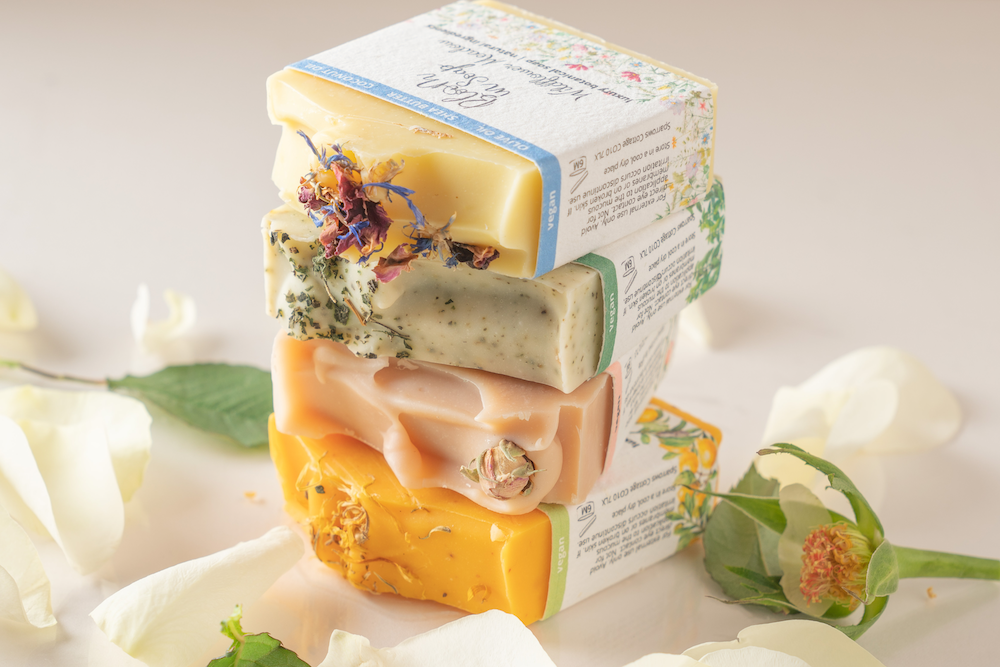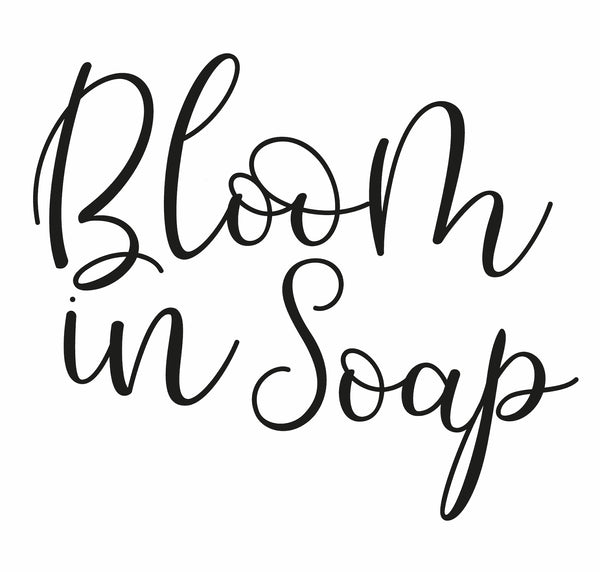
The Secret to Achieving Soft, Smooth Skin with Natural Handcrafted Soap
Share

Benefits of using handcrafted soap
There are numerous benefits to using handcrafted soap. Firstly, they are made with natural ingredients that are gentle on the skin. Commercial soaps often contain harsh chemicals such as sodium lauryl sulfate (SLS), which can strip the skin of its natural oils and cause irritation. Handcrafted soaps, on the other hand, are made with ingredients such as coconut oil, olive oil and shea butter, which are nourishing and moisturising for the skin.
In addition to being gentle on the skin, handcrafted soaps are also environmentally friendly. Commercial soaps often contain synthetic ingredients that are harmful to the environment, whereas handcrafted soaps are made with natural ingredients that are biodegradable and sustainable.
Glycerin is a big advantage in handcrafted soap, formed in cold process soap making by a chemical reaction called saponification. Saponification is the reaction of a fat or oil with an alkali, such as lye. When this reaction occurs, the fat or oil is converted into soap and glycerin. The amount of glycerin produced in cold process soap making is about 10% of the weight of the oils used.
Glycerin is a humectant, which means it attracts water. This makes glycerin a valuable ingredient in soap, as it helps to keep the skin hydrated. Glycerin also has moisturising and soothing properties, which can be beneficial for people with dry or sensitive skin. In commercial soap making, glycerin is often removed from the soap and sold as a separate product. However, in cold process soap making, the glycerin is left in the soap.
The presence of glycerin in cold process soap makes it a more moisturising and gentle soap than commercial soaps. If you are looking for a soap that is gentle on your skin and that can help to improve your skin's moisture levels, then cold process soap is the best option.
In addition, handcrafted soaps are often made by small businesses and artisans, which means that every bar is unique and made with care. By using handcrafted soap, you are supporting local businesses and contributing to a more sustainable and ethical economy.

Understanding the ingredients in handcrafted soap
Handcrafted soap is made with a variety of natural ingredients, each of which has its own unique benefits for the skin. Some of the ingredients found in our handcrafted soap bars include:
- Coconut oil: Coconut oil is a natural moisturiser that is rich in fatty acids and antioxidants. It is easily absorbed by the skin, leaving it feeling soft and smooth.
- Olive oil: Olive oil is another natural moisturiser that is high in antioxidants and Vitamin E. It is particularly beneficial for those with dry skin, as it helps to soothe and hydrate.
- Shea butter: Raw shea butter is a natural emollient that is rich in Vitamins A, E, and F. It is deeply moisturising and helps to protect the skin from damage caused by environmental stressors.
- Essential oils: Essential oils are plant-based oils that are known for their therapeutic properties. They can be used to add fragrance to handcrafted soap and also provide additional benefits for the skin. For example, lavender essential oil is known for its calming and soothing properties, while tea tree essential oil is known for its antibacterial properties.
The difference between handcrafted soap and commercial soap
The main difference between handcrafted soap and commercial soap is the ingredients used. Commercial soaps are often made with synthetic ingredients and harsh chemicals, which can be harmful to the skin. Handcrafted soaps, on the other hand, are made with natural ingredients that are gentle and nourishing for the skin.
Another difference between handcrafted soap and commercial soap is the way they are made. Handcrafted soap is made using a process called cold process soap making, which involves mixing oils and lye together to create a chemical reaction that turns them into soap. This process takes several weeks and results in a naturally moisturising and gentle soap.
Commercial soap, on the other hand, is often made using a process called hot process soap making, which involves heating the ingredients together to create a faster soap making process. This process can result in a harsher soap that can strip the skin of its natural oils.
The secret to achieving soft, smooth skin with handcrafted soap
The secret to achieving soft, smooth skin with handcrafted soap is to choose the right soap for your skin type. Different types of soap are formulated to address specific skin concerns, such as dryness, acne, or eczema.
For example, if you have very dry skin, you may want to choose a soap that is made with moisturising ingredients like shea butter and olive oil like these soap bars. If you have acne-prone skin, you may want to choose a soap that is made with tea tree essential oil, which has antibacterial properties that can help to fight acne-causing bacteria.
In addition to choosing the right soap, it's also important to use it correctly. When using handcrafted soap, it's best to lather it up in your hands before applying it to your skin. This helps to create a rich lather that will cleanse your skin without stripping it of its natural oils.

How to choose the right handcrafted soap for your skin type
When choosing a handcrafted soap for your skin type, it's important to consider your specific skin concerns. Here are some tips for choosing the right soap:
- Dry skin: Look for soaps that are made with moisturising ingredients like shea butter, coconut oil, or olive oil.
- Acne-prone skin: Look for soaps that are made with tea tree or rosemary essential oil, which both have antibacterial properties that can help to fight acne-causing bacteria, and sea salt which has natural healing properties.
- Sensitive skin: Look for soaps that are made with gentle ingredients like oatmeal or calendula and that have been left unscented.
- Eczema-prone skin: Look for soaps like this one that are made with ingredients like shea butter, coconut milk and colloidal oatmeal, which can help to soothe and hydrate eczema-prone skin.

Tips for using handcrafted soap effectively
To get the most out of your handcrafted soap, here are some tips for using it effectively:
- Store your soap in a dry, cool place to prevent it from getting soggy.
- Use a soap dish with drainage holes to allow your soap to dry between uses.
- Lather up your soap in your hands before applying it to your skin.
- Use warm water to rinse off your soap, as hot water can strip your skin of its natural oils.
- Pat your skin dry with a clean towel after using your soap.

The importance of supporting small businesses and artisans
By choosing to use handcrafted soap, you are not only supporting your own skin health but also supporting small businesses and artisans. Handcrafted soap is often made by local artisans who put care and attention into every bar they make. By supporting these businesses, you are contributing to a more sustainable and ethical economy.
Frequently asked questions about handcrafted soap
Here are some frequently asked questions about handcrafted soap:
- Is handcrafted soap more expensive than commercial soap? Handcrafted soap can be more expensive than commercial soap, but it is often more nourishing and longer-lasting.
- Can handcrafted soap be used on the face? Yes, handcrafted soap can be used on the face, but choose a soap that's ideally fragrance free.
- How long does handcrafted soap last? A bar of handcrafted soap can last for several months, depending on how often it is used, how many people are using it, and how it is stored.
- Can handcrafted soap help with eczema? Yes, handcrafted soap that is made with ingredients like shea butter or colloidal oatmeal can help to soothe and moisturise eczema-prone skin.

Why handcrafted soap is the best choice for healthy, beautiful skin
Handcrafted soap is a natural and nourishing choice for achieving healthy, beautiful skin. Made with natural ingredients like shea butter, coconut oil, and essential oils, these soaps provide a luxurious and nourishing experience for your skin. Unlike commercial soaps that often contain harsh chemicals, handcrafted soaps are gentle on the skin and free from harmful additives. By choosing to use handcrafted soap, you are not only supporting your own skin health but also supporting small businesses and artisans who put care and attention into every bar they make. So, if you're ready to unlock the secret to achieving soft, smooth skin, it's time to switch to natural handcrafted soap.
